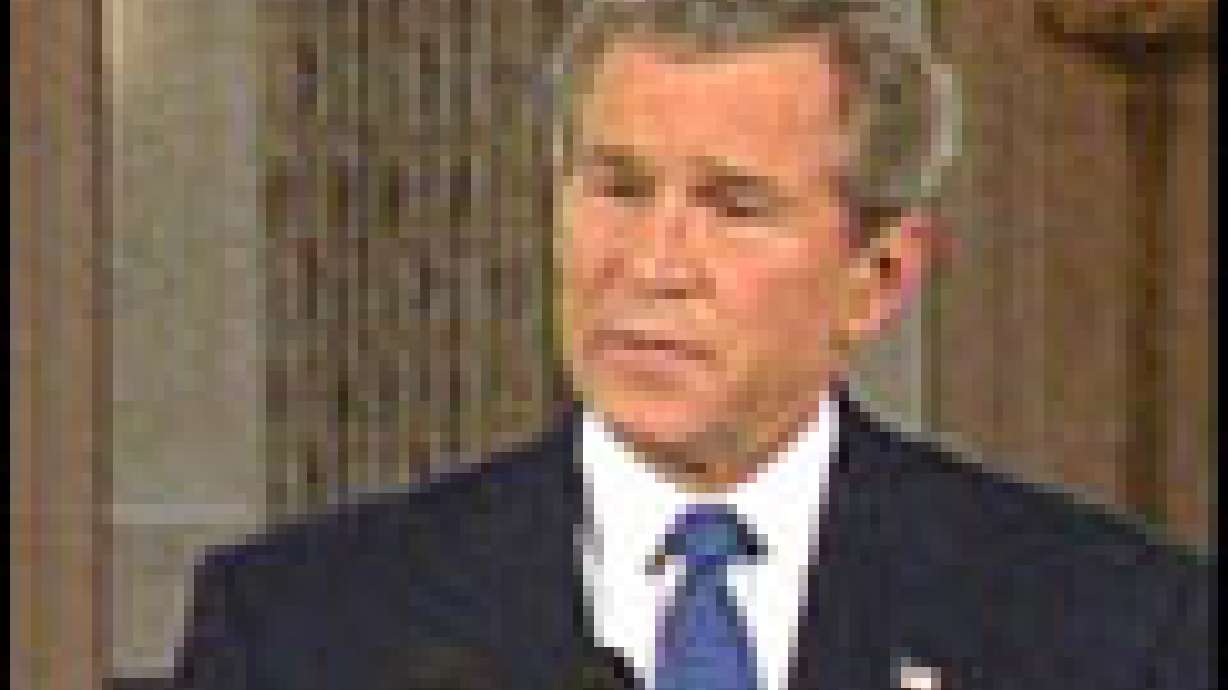Estimated read time: 4-5 minutes
This archived news story is available only for your personal, non-commercial use. Information in the story may be outdated or superseded by additional information. Reading or replaying the story in its archived form does not constitute a republication of the story.
CAMP DAVID, Md. (AP) -- President Bush said Tuesday "it's just a matter of time" before terrorist leaders like Osama bin Laden and Saddam Hussein are captured.
Bush said it could take days, months or years before the United States and its allies complete the search for terrorist leaders. "We're just on the hunt," Bush said at a news conference with Pakistani President Pervez Musharraf.
"It doesn't matter how long it takes, Mr. President," Bush said, nodding to Musharraf.
Bush didn't directly answer a reporter's question about the whereabouts of bin Laden or Saddam, saying "there are more than two principals at large" and saying the United States and its partners were capturing or killing other members of both men's circles.
"There's more than two principals at large. There are terrorists who still have designs on destabilizing the Pakistani government and/or destroying innocent life. You named two," Bush said. "There are others around, too, and we are just on the hunt, and we'll find them. It's a matter of time."
Musharraf said his government was making extraordinary efforts to track down bin Laden and his lieutenants. For the first time, his military is searching tribal border areas that have not been entered by the army in more than a century.
He called these regions "treacherous" territory.
Musharraf has said he thinks bin Laden may be alive in Pakistan.
But, he told a reporter, "whether Osama bin Laden is here or across the border, your guess, sir, would be as good as mine, so I wouldn't like to venture into a guess."
Bush credited Musharraf with capturing more than 500 al Qaida and Taliban leaders, and he called Musharraf "a courageous leader" and a friend of the United States.
Musharraf basked in the prestige of Bush's Camp David invitation, and thanked Bush for the "special gesture." Musharraf was the first Southeast Asian leader to get such an invitation.
Bush announced that the two countries were signing a new trade and investment agreement and he pledged to work with Congress on a $3 billion assistance project for Pakistan. Further, Bush said the United States had forgiven $1 billion owed by Pakistan in the last year.
Bush said he was encouraged by progress India and Pakistan have made in easing tensions over Kashmir and other issues, and he pledged that "we will do all we can to promote peace."
He also praised Musharraf for setting out to build "a modern Pakistan that is tolerant and prosperous," but said that "will require movement toward democracy," particularly in enhancing the rights of women and girls.
After Musharraf backed the U.S.-led effort in 2001 to oust the ruling Taliban militia from Afghanistan, the Bush administration lifted many sanctions imposed against Pakistan because of its nuclear arms program and the 1999 coup that brought Musharraf to power.
Some penalties remain, however, over both the nuclear program and the coup. For instance, Congress continues to block release of 28 F-16 fighter jets that Pakistan bought 13 years ago, and U.S. officials said Monday that Bush was unlikely to recommend now that the fighters be released.
Both U.S. and Pakistani officials said they expected India-Pakistan tensions to be high on the agenda for the Bush-Musharraf talks. The United States has played an important behind the scenes role to arrange negotiations between India and Pakistan, Khan said.
Bush and Musharraf both will "be looking at ways to bring about a reduction in tension and to kick-start a meaningful, result-oriented, composite dialogue," the Pakistani official told reporters Monday in Islamabad.
Indian Prime Minister Atal Bihari Vajpayee initiated a thaw in relations with Pakistan in April, offering "a hand of friendship." The effort has appeared to falter since then.
As part of the war on terror, the Bush administration is pressing Pakistan to end its help for militant groups in India-controlled parts of the Kashmir region.
Control of the disputed territory, three-fifths of which is under Indian rule, has been a flash point in India-Pakistan relations for half a century. India accuses Pakistan of training and arming Islamic militants in Kashmir, which Pakistan denies.
Pakistani police have recently been rounding up Islamic militants. On Monday, Pakistani officials announced the arrests of five suspected members of an outlawed militant group blamed for killing Shiite Muslims and the kidnap-slaying of American Wall Street Journal reporter Daniel Pearl.
The Bush administration also is encouraging Pakistan to extend formal recognition to Israel to help build Islamic support for a U.S.-backed "road map" to peace between Israel and the Palestinians.
Pakistan, the only Muslim country with nuclear weapons, never has formally recognized Israel's right to exist. Musharraf has recently hinted his country might re-evaluate its position under certain circumstances.
That has led to speculation that Bush might offer a more aggressive U.S. role on mediating the India-Pakistan conflict in exchange for Pakistan's willingness to recognize Israel.
Pakistan has said it supports the "road map," which would lead to a full-fledged Palestinian state alongside Israel by 2005.
(Copyright 2003 by The Associated Press. All Rights Reserved.)








